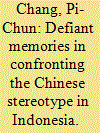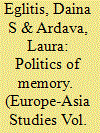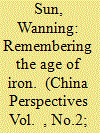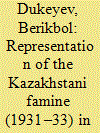|
|
|
Sort Order |
|
|
|
Items / Page
|
|
|
|
|
|
|
| Srl | Item |
| 1 |
ID:
191780


|
|
|
|
|
| Summary/Abstract |
This study considers Batavia’s first Chinese captain, Souw Beng Kong (1580–1644) as an example of the memory politics of urban Chinese Indonesians in Jakarta. It explores how and why he has been remembered in the contemporary era. While the stereotype of Chinese Indonesians has its roots in the Dutch colonial period, this study takes the Dutch institution of the captain as a framework to examine what is remembered as a way to bind group members together in a shared community of memory. This study argues that remembering Souw represents an implicit but defiant response to a long-standing negative stereotype that the ethnic Chinese in Indonesia are perennially alien outsiders.
|
|
|
|
|
|
|
|
|
|
|
|
|
|
|
|
| 2 |
ID:
141313


|
|
|
|
|
| Summary/Abstract |
Over at least the past quarter century, observers, historians, and journalists have painted a damning picture of the treatment that African Americans have received from their government and fellow citizens, not only during slavery and the era of segregation but far into the twentieth century. Yet many of these observations and reports have simply been ignored and, although others received some attention for a time, none has become part of the country’s standard public history. My premise is that the continued failure in the United States to incorporate these observations and reports into its standard history has a profound effect on its political culture. I therefore begin by briefly recalling some aspects of post-Civil War African American history and consider the American antipathy to confronting this history by looking at Charles Mills’s account of “white ignorance.” While some theorists have tried to supplement Mills’s realist framework with a more sophisticated one indebted to Critical Theory, I move in a different direction, drawing out some of the implications of the distinctive approach known as philosophical hermeneutics. By doing so, I hope to demonstrate how a hermeneutic perspective can contribute to serious discussion among U.S. political scientists and political educators about the links between racial inequality and historical understanding and its absence.
|
|
|
|
|
|
|
|
|
|
|
|
|
|
|
|
| 3 |
ID:
113316


|
|
|
|
|
| Publication |
2012.
|
| Summary/Abstract |
On 23 August 1989, two million Balts joined hands in a human chain that stretched through Estonia, Latvia and Lithuania. How has this phenomenon of solidarity against the Soviet regime and historical remembrance of the Molotov-Ribbentrop Pact been narrated and commemorated in the 20 years that followed? This article highlights the memory and commemoration of the Baltic Way in Latvia and identifies agents and contesting narratives in memory politics. It introduces the concept of commemoration spectacle, a collective ritual untethered from the burdens of the past or 'grand narratives' of history, which subsumes struggles over memory beneath show and spectacle.
|
|
|
|
|
|
|
|
|
|
|
|
|
|
|
|
| 4 |
ID:
184016


|
|
|
|
|
| Summary/Abstract |
IN THE 21st century, the politics of memory is becoming even more relevant as a tool of international relations. This is amply confirmed by Japan, where the past traditionally serves as a tool for legitimizing the political and social order and largely shapes foreign policy principles. But this past contains many dark chapters that stir up conflicts with its neighbors. Many of them are rooted in the distant past, when Japan aggressively spread its influence in Asia. Japanese expansion caused thousands of deaths.
|
|
|
|
|
|
|
|
|
|
|
|
|
|
|
|
| 5 |
ID:
139303


|
|
|
|
|
| Summary/Abstract |
Over the past few years we have witnessed a minor cultural phenomenon in China, with the production and enthusiastic reception nationwide of several television dramas about Chinese workers in the socialist decades. Set in the industrial plants of Liaoning in China’s northeast, once the industrial powerhouse of the socialist nation, these drama series centre on the dramatic transformation in workers’ experiences from 1949 to the start of economic reforms. In this paper I explore these series, asking: what does the smallscale production but enthusiastic reception of this genre tell us about the contemporary cultural politics of class? This paper addresses this question by (1) highlighting the key aspects of workers’ experiences with socialism as depicted in these television narratives; (2) considering the creative agenda of Gao Mantang, the script writer of the most successful industrial-themed television series; and (3) identifying some crucial ways in which the subjectivity of workers and other social groups in contemporary Chinese society intersect to shape the cultural politics of class. This discussion shows that television dramas have indeed become the basis of a widely accessible public forum that helps forge a renewed appreciation of the moral integrity of China’s working class, vent a widespread sense of injustice, and foster a certain degree of solidarity between workers and other social classes. At the same time, while television dramas about workers may hold significant potential for mobilising public support for the working class and advocating workers’ interests, this discussion also suggests that so far this potential has not been fully exploited
|
|
|
|
|
|
|
|
|
|
|
|
|
|
|
|
| 6 |
ID:
190828


|
|
|
|
|
| Summary/Abstract |
This paper studies the role of textbook authors when portraying the Kazakhstani famine of 1931–33 in textbooks printed between 1992 and 2021 for the secondary school subject ‘The History of Kazakhstan’. Drawing on a multilayered and inter-discursive analysis of seven of these textbooks, and after 10 interviews with curriculum developers and textbook authors, this paper argues that authorship agencies have reflected a level of ambivalence: on the cause(s) of the famine; on their evaluation of it as a tragedy or as a genocide; on the identification of the perpetrators and victims; and the people’s revolt against the collectivization. The textbook authors have echoed the narratives from the cautious approach to the famine’s commemoration portrayed in state-led nation-building, to those in Kazakh nationalist narratives and the academic history. The results of this paper oppose the general assumption that textbook narratives are merely constructed from ‘above’ in a non-democratic state such as Kazakhstan.
|
|
|
|
|
|
|
|
|
|
|
|
|
|
|
|
| 7 |
ID:
189167


|
|
|
|
|
| Summary/Abstract |
THE POLITICS OF MEMORY is a necessary and very important tool used in shaping statehood, consolidating society around a set of state-forming ideas and interpretations. In practice, these are activities by the state and other interested parties to manipulate social groups by adjusting or changing their values and their images of the past. The symbols that are employed to this end are signs that are clear and easily recognizable within social subgroups, and that embody certain values/qualities, standards of behavior, or goals.
|
|
|
|
|
|
|
|
|
|
|
|
|
|
|
|
| 8 |
ID:
186025


|
|
|
|
|
| Summary/Abstract |
This article examines the politics of renaming streets as a symbolic form of decommunisation in Ukraine. The evidence suggests that political factors, or ‘politics of the present’, rather than structural factors, or ‘politics of the past’, explain the opposition to decommunisation since 2015. More specifically, two mutually necessary factors—the interaction among subnational veto players and the efforts of toponymic commissions—explain the opposition to the renaming of streets. Regions with a high number of subnational veto players and low engagement by toponymic commissions have shown a higher degree of resistance to the renaming of streets.
|
|
|
|
|
|
|
|
|
|
|
|
|
|
|
|
|
|
|
|
|